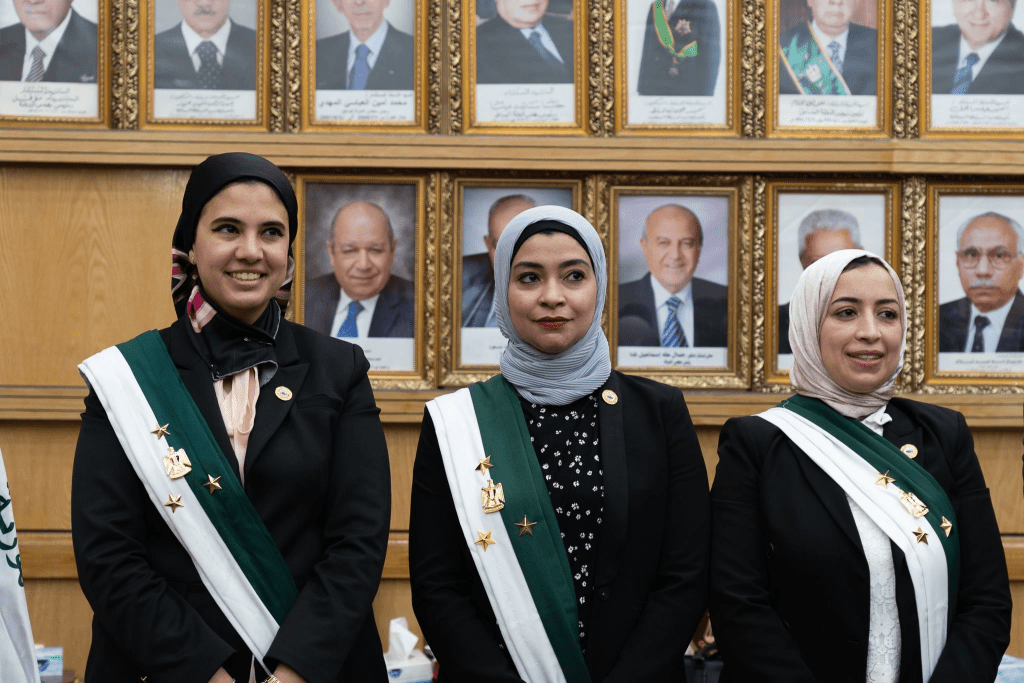For decades, women in Egypt have sought equal representation in the judiciary, with the State Council long symbolizing one of the most difficult barriers to break.
In a landmark decision, the President of the Republic has approved the appointment of 48 female judges among a cohort of 207 assistant delegates from the 2021 class. This marks the first time women are directly appointed to the State Council from a graduating class—an important breakthrough in the history of the Egyptian judiciary.
1952: Aisha Rateb and the First Legal Challenge
The battle for women’s right to serve on the State Council dates back to the 1950s. In 1952, Aisha Rateb, a pioneering lawyer, diplomat, and later minister, filed the first lawsuit demanding her appointment to the Council, but her case was rejected.
Over the following decades, women were able to assume judicial positions in other bodies, such as the Administrative Prosecution and the State Lawsuits Authority, but the State Council remained closed to them.

2014: Constitutional Guarantee of Equal Judicial Appointments
A new turning point came with the provisions of the 2014 Constitution, which explicitly stipulate that women are entitled to be appointed to judicial bodies and authorities without discrimination. This created a constitutional basis for women’s right to serve in the State Council, though implementation was slow.

2021: First Female Judges Appointed Through Transfer
On March 11, 2021—coinciding with International Women’s Day—President Abdel Fattah El-Sisi issued a directive to Minister of Justice Omar Marwan to appoint women as members of the State Council and the Public Prosecution. The decision was a step toward achieving equality in judicial appointments.
That year, 98 female judges were appointed to the State Council through transfer from the Administrative Prosecution Authority and the State Lawsuits Authority. This came 72 years after the Council’s establishment, during which no women had previously been appointed.
While it marked a historic milestone, the pathway for women at that stage was still limited to transfers, unlike their male peers, who could apply directly after graduation.

A First in 2025: Direct Appointment of Female Graduates
The 2025 decision to appoint 48 women among 207 assistant delegates from the 2021 class is unprecedented. For the first time, female law graduates are entering the State Council directly, rather than through transfer. This marks a qualitative shift in the Council’s history since its establishment and demonstrates the gradual dismantling of barriers that women faced for decades.
The appointments came after candidates successfully passed all the screening and review stages set by the Supreme Council of the State Council, in accordance with established legal and constitutional standards.

The First Name in the Decree
Notably, the first name in the presidential decree, Toka Ismail Sayed Abd Elmaksoud, was that of a female graduate, ranked on the basis of evaluation and university performance rather than alphabetical order. This symbolic moment underscores the recognition of women’s academic excellence and judicial readiness.

Conclusion
The path for women to join the State Council has been long and hard-fought. The 2025 appointments represent not just a historic breakthrough but also a tangible realization of equality in practice. By directly appointing women alongside their male counterparts, the State Council has taken a decisive step toward inclusivity—marking a significant victory in the broader story of women’s empowerment in Egypt.
WE SAID THIS: Don’t Miss...For The First Time in Egypt, Three Female Judges Join the State Council’s Technical Office



